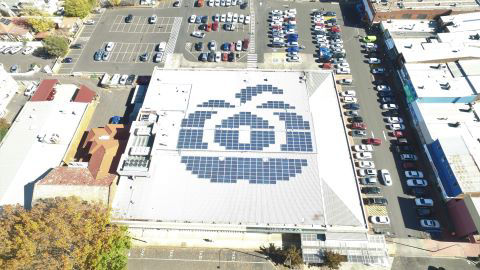New Woolworths Group Sustainability Plan includes commitment to zero food waste to landfill by 2025
100% of Woolworths’ own brand packaging to be recyclable, reusable or compostable by 2023
Net positive carbon emissions by 2050
Thursday, 12 November 2020: Woolworths Group will power its entire operations with renewable electricity by 2025, on the road to net positive carbon emissions by at least 2050.
The ambitious power pledge is part of the retail group’s newly announced Sustainability Plan, which charts its path to 2025. The plan includes a range of initiatives across three key pillars - Planet, Product and People - to help deliver a better tomorrow for Woolworths customers, team members, communities and the environment.
As Australia’s largest retailer, the Group’s transition to renewable energy represents a significant investment in the sector over the next five years. Woolworths will partner on new build renewable energy projects to amplify its contribution to growing the industry and is calling on green energy operators to help it make the large-scale transition across all its stores and support operations.
The Group has also pushed its emissions targets further, committing not only to reach net neutral carbon emissions but to make its operations net carbon positive by at least 2050, meaning it will remove more carbon from the atmosphere than it produces. Recognising the urgency of change, Woolworths will work at pace towards achieving this milestone ahead of time.
Woolworths Group CEO Brad Banducci, said: “Moving to 100 per cent renewable electricity is the right thing to do, and something a growing number of our customers, team members and shareholders expect us to lead on.
“It represents a significant acceleration in our ambition to reduce carbon emissions for the health of our planet and the communities we serve across Australia and New Zealand.
“We use around one per cent of Australia’s national electricity, so we have a unique opportunity to use our scale for good and make a real impact.
“Over the coming years, we’ll invest tens of millions of dollars into renewable energy partnerships and prioritise new green energy projects to spur growth in the industry and new jobs in the sector.
“We believe this will not only be a positive for our business, but also contribute to a better tomorrow by making green energy accessible to more Australians.”
REenergise Campaign Director Lindsay Soutar of Greenpeace Australia Pacific, said: "Woolworths committing to 100 per cent renewable electricity by 2025 will put solar and wind power at the heart of Australian communities across the country.
“The vast scale of Woolworths’ commitment, as one of the country's largest electricity users, will bring a huge amount of new wind and solar energy online, boosting Australia’s energy capacity, creating good energy jobs and speeding our transition to a renewable-powered grid.”
As part of its green electricity pledge, the Group has joined the global RE100 initiative, led by The Climate Group in partnership with CDP.
Renewable power purchase agreements with wind and solar energy providers will build upon the retailer's expanding network of solar panels, currently installed across more than 150 locations nationally.
Woolworths Group has already reduced its carbon emissions by 24 per cent from 2015 levels through initiatives to improve energy efficiency. The Group’s 2030 emissions reduction targets of 63 per cent for its own operations and 19 per cent across its supply chain align with the Paris Agreement’s goal of limiting climate change to +1.5 degrees. The targets have been endorsed by the global Science Based Targets initiative (SBTi) - a first for an Australian retailer.
The transition to renewable energy is one of the Group’s comprehensive sustainability commitments announced today encompassing food waste, sustainable packaging and responsible sourcing.
Brad Banducci concluded: “We firmly believe that a better tomorrow starts today. It’s the steps we take today to become a more sustainable business by cutting emissions, eliminating food waste, reducing plastic and sourcing responsibly that will help create a brighter future.
“We want to give our customers confidence that their food and everyday needs are delivered to them ethically, sustainably and that we continue to lift the bar for our industry.”
Other key initiatives of Woolworths Group’s Sustainability Plan 2025 include:
Food waste: By 2025 zero food waste will go to landfill from Woolworths’ operations, with the retailer aiming to redistribute 100 per cent of edible unsold food to those who need it most through food relief partnerships with organisations like OzHarvest, Foodbank and FareShare and relationships with local community groups. Woolworths donates the equivalent of 18 million meals every year.
Packaging: By 2023, 100 per cent of packaging on Woolworths’ own brand products will be widely recyclable, reusable or compostable. As part of Woolworths’ ongoing program to reduce plastic waste and improve recyclability across its own brand packaging, it’s removed 1,320 tonnes of plastic through redesigned packaging in the last two years.
Deforestation: The Group has committed to net zero supply chain deforestation for high-impact commodities in its own brand products like palm oil, timber, pulp and paper, and packaging by 2025.
